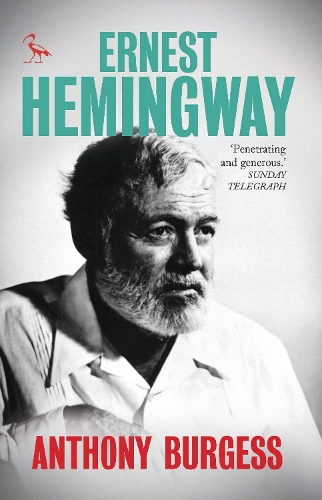
Ernest Hemingway
Publishing Details
Ernest Hemingway
By (Author) Anthony Burgess
Foreword by Patrick Marnham
Bloomsbury Publishing PLC
Barbara Ward & Associates
1st August 2015
United Kingdom
Classifications
General
Non Fiction
Literary studies: fiction, novelists and prose writers
Literary studies: c 1900 to c 2000
813.52
Physical Properties
160
Width 127mm, Height 193mm, Spine 10mm
200g
Description
Ernest Hemingway was arguably the most influential writer of the 20th century, the Nobel Prize-winning author of such classics as For Whom the Bell Tolls, The Sun Also Rises and A Farewell to Arms, and a man who lived his life with as much passion and intensity as many of the characters in his novels. With exceptional insight, Anthony Burgess traces Hemingway's singular life: from complacent childhood to the horrors of the First and Second World Wars to the glamour of Paris in the '20s; from Civil War Spain to the excitements of African safari and, finally, the sombre last years in Cuba. Burgess's vivid portrait is unflinching yet full of empathy: essential reading for all Hemingway fans.
Reviews
A superior contribution. Burgess brings empathy as well as knowledge to this study. * Evening Standard *
Penetrating and generous. * Sunday Telegraph *
Author Bio
Anthony Burgess (1917-1993) was born in Manchester and educated at Xavierian College and Manchester University. He spent six years in the army during World War II become becoming a schoolmaster and a colonial education officer in Malaya and Brunei. After the success of his Malayan Trilogy, he became a full-time writer in 1959.
He achieved a worldwide reputation as one of the leading novelists of his day, and one of the most versatile. He wrote criticism, stage plays, translations and a Broadway musical. He also composed more than 150 musical works, including a piano concerto, a violin concert for Yehudi Menuhin and a symphony. His books have been published all over the world and include A Clockwork Orange, Shakespeare, the Complete Enderby, Nothing Like the Sun, A Dead Man in Deptford, Earthly Powers and Little Wilson and Big God. He also wrote reams of journalism in his role as long-time literary critic of The Observer and The Guardian.
